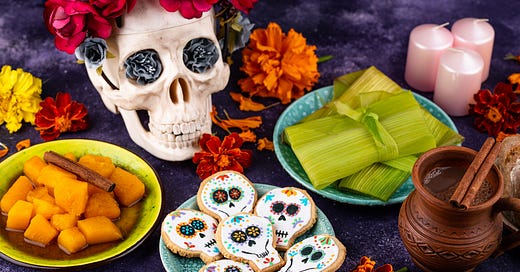A Potholder Hug
Getting comfortable with nostalgic food and learning to enjoy the emotions embedded in traditional celebrations.
These days, cooking often makes me emotional. Or, rather, cooking certain dishes has that effect on me. The slow and repetitive pouring, waiting, and flipping of pancake preparation on a Sunday morning inevitably makes me teary-eyed and nostalgic for my mother’s fluffy white pancakes at those barely remembered weekend family breakfasts and, for some obscure reason, makes me think of my estranged oldest daughter. The fragrant yeast working, miraculous dough rising, and energetic kneading of bread baking inevitably brings both a tear and a smile as I remember how each of my daughters approached that same project in such different ways forty-some years ago: the eldest with her determination and neatness, and the youngest with her playful abandon.
The twinning of food and emotions appears often in both popular writing and psychology. We're told which foods to eat in order to balance our emotions and calm anxiety (ones rich in B vitamins). We're supposed to eat calmly and mindfully, and in good company. We learn about the relationship between emotions and eating behaviors, about cravings and shame.
We also know from experience that eating certain foods can elicit feelings of nostalgia. Now, I'm not big on nostalgia. I think it can distort the past and put unrealistic expectations on the present, and is often extravagantly sentimental. Nostalgic eating also often involves unhealthy foods. These are all reasons why I'm also not big on those traditional holidays that focus on food, such as Halloween, Easter, Valentine's Day...well, most of them. Yeah, I tend to be known as the family grump when those days come around; I'm trying to recover.
Part of my “recovery” has had me examining that emotionalism I described earlier. I'd thought the trigger was family circumstances and my age until I neared the end of the book Animal, Vegetable, Miracle: A Year of Food Life by Barbara Kingsolver. This is the story of how the author’s family documented a year of procuring as much of their food as possible from neighbouring farms and their own backyard. (When it was published in 2007, it had mixed reviews, with some people thinking it was preachy; I liked it, for what that's worth.) At any rate, in one chapter, Kingsolver writes about how food anchors holiday traditions and how she had subconsciously “spent years denying the good in that.” That sentence spoke to me loudly and clearly.
She describes how she got over that and now embraces all the food-related celebrations, including one at the beginning of November called Dia de los Muertos – the Mexican Day of the Dead. This surprisingly happy occasion has its roots in the cultures of the indigenous people of the Americas, dating back thousands of years. The Lady of the Dead presided over rituals that welcomed the spirits of dead friends and ancestors back among the living by building altars that included flowers, candles, photos, food, and beverages. Aside from the fact that Dia de los Muertos seems like a welcome antidote to Hallowe’en, which, aside from all that candy, characterizes death as grotesque and scary, Kingsolver points out that it creates a positive opportunity for remembering people.
As I read her words: “When I cultivate my garden I’m spending time with my grandfather, sometimes recalling deeply buried memories of him,” I realized the source of my recent kitchen emotionalism. When I’m cooking certain dishes, I am experiencing the person who taught me how to cook a certain dish, or with whom I used to cook it. Some of those people are now dead, some live far away, some are not in my life for other reasons. Some of the memories and emotions are old, a few more recent. The majority are bittersweet. But now, I am becoming more comfortable with the nostalgia involved with those food-related memories and, when it arises, I give those people what Kingsolver, with her gentle wit, calls a “potholder hug.”
Maybe nostalgia like I experience so often when I cook can be a protective emotion, perhaps even productive if it gets us in touch with what's important in our lives. Enough of those imaginary hugs and maybe we can recover from some of the social dislocation created by the Covid-19 pandemic! Is it too soon to start Christmas baking?



